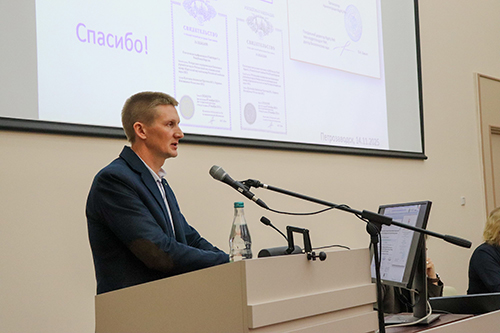
KarRC RAS Director General Olga Bakhmet and Leading Research Engineer at KarRC RAS Institute of Applied Mathematical Research Natalya Krizhanovskaya
– It’s great that our scientists’ work is highly appreciated by federal and regional agencies and authorities, – noted Olga Bakhmet, congratulating the colleagues.
A scientific lecture was delivered by Head of Zoology Laboratory, Institute of Biology KarRC RAS, Konstantin Tirronen. A study implemented by the scientist and his colleagues has demonstrated how wolf hunting triggers certain mechanisms within the population that enable the species to stay viable.

The scientist argues that understanding the genetic changes and evolutionary transformations in species actively exploited by humans is crucial for developing strategies for the management, conservation and sustainable use of biological resources. In Karelia, wolf numbers have changed significantly since the middle of the previous century. Today, the animals are suffering heavy hunting pressure.
In their study, scientists identified the "genetic fingerprints" of different population management strategies and the species' responses to these impacts. This was done through a comparative genetic analysis of wolf samples from different spatiotemporal datasets: Karelia 1960-1995, Karelia 2012-2023, Kondopoga District and Onezhskoye Pomorye. The latter is a national park in the Arkhangelsk Region. The hunting impact there is minimal, so this category was taken for reference.

Participants of the Learned Council meeting
As a result, scientists have described the genetic status of the wolf population and demonstrated the consequences of excessive hunting pressure on the species.
– In the course of our work, we managed to characterize the genetic diversity in the population under different degrees of pressure: under high pressure, where wolves are not hunted, and under moderate impact. We also saw the consequences: a rise in inbreeding, interbreeding with dogs and a loss of genetic diversity through the loss of some haplotypes and private alleles, – summed up Konstantin Tirronen.
The results of the study were published in high-ranking scientific journals.
Commenting on the presentation, Learned Council members highly commended the work. "It’s important, among other things, that the studies have used the latest, cutting-edge approaches", – stressed Olga Bakhmet.
In conclusion, the participants discussed some technical issues in view of this year’s final meeting in December.















